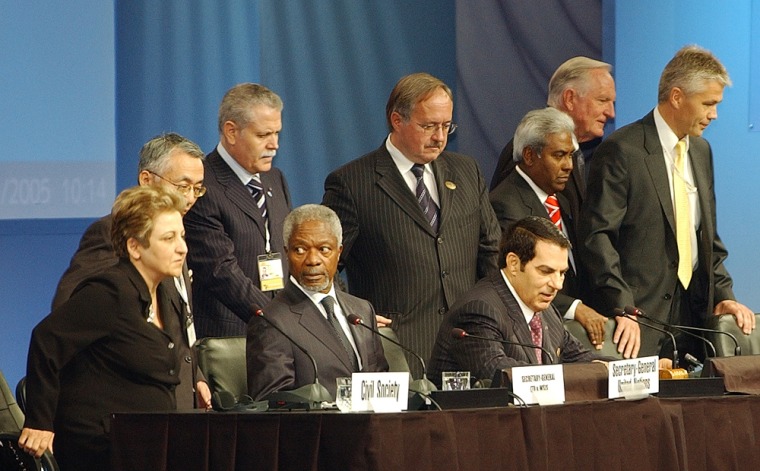Despite a late-night agreement averting a global showdown over continued U.S. control of the Internet’s addressing system, many delegates to a U.N. technology summit did not believe the Americans emerged victorious.
Representatives of a number of countries remained adamant that U.S. control must be tempered if the Internet is to fully reach its potential. And even traditional allies of Washington considered it to have opened the door to the possibility of more shared governance.
President Robert Mugabe of Zimbabwe spoke for the more radical opposition to U.S. control, saying Washington and its allies cannot continue to “insist on being world policemen on the management of the Internet.”
“Why should our diverse world be beholden to an American company?,” he told more than 10,000 government, business and other delegates as the three-day U.N. World Summit on the Information Society opened Wednesday.
A quasi-independent group, the Internet Corporation for Assigned Names and Numbers, or ICANN, manages the worldwide network’s main addressing computers on the U.S. government’s behalf.
Mugabe’s remarks signaled that, despite the U.S. success in winning over a broad group of nations including the European Union bloc, underlying complaints about American hegemony in Internet control still linger.
In an extreme case, complaints left unchecked could prompt dissatisfied countries to create their own addressing system, splintering the Internet such that two people typing in the same Web address may reach different sites, depending on where they live.
Questions about the Internet’s plumbing have overshadowed the summit’s original intent: to address ways to expand communications technologies to poorer parts of the world.
Delegates from more than 100 countries wrapped up nearly three days of heavy talks late Tuesday by agreeing to leave the United States with oversight of the computers that act as the Internet’s master directories so Web browsers and e-mail programs can find other computers.
David Gross, the U.S. State Department’s top official on Internet policy, said he was thrilled by the last-minute deal, saying it “reaffirmed the role of technology to the world and preserved the unique role of the U.S.”
Publicly, officials were positive on the agreement, noting that it brought together government, business and civil leaders to work out issues surrounding Internet governance.
Privately, many delegates fumed, noting that the secretive talks, which had been expected, seemed to take away from the focus of the summit. Many complained that the United States was grandstanding.
Martin Selmayr, an EU spokesman, said the 25-nation European bloc was the one celebrating after the deal was reached.
The EU had stepped up pressure for more international participation after the United States declared in June that it would not cede control over the Internet, as many had been led to believe.
“What we see here is a clear indication that what they (the U.S.) said in June is not the last word and that we are back on track towards internationalization,” he said. “We are back on track to what has been agreed with the Clinton administration already some years ago. We are back to cooperation.”
Although Pakistan and other countries sought a takeover of that system by an international body such as the United Nations, negotiators ultimately agreed, as time ran out, to a create an open-ended international forum for raising important Internet issues. The forum, however, would have no binding authority.
“The U.S. has done a good job making the Internet safe for robust political discussion and commerce, but will gradually need to start recognizing international norms,” said Frank Pasquale, a law school professor at Seton Hall University in New Jersey.
Regardless of who claimed victory, delegates and officials involved in the talks said the new forum would give nations a stronger say in how the Internet works, including perhaps spurring the availability of domain suffixes in Chinese, Urdu and other languages.
“They want a seat at the table and they have a forum at which to have a seat,” said Paul Kane, chairman of an organization for European country-code domain suffixes.
Currently, though names partially in another language are possible, the suffix — the “.com” part — remains in English.
The new group, the Internet Governance Forum, could also address any issue, such as spam or cybercrime, not currently covered by ICANN.
U.N. Secretary-General Kofi Annan, who would open the forum’s first meeting perhaps early next year in Athens, denied the United Nations wanted to assume ICANN’s day-to-day duties.
“Let me be absolutely clear: the United Nations does not want to take over, police or otherwise control the Internet,” he said. “Day-to-day running of the Internet must be left to technical institutions, not least to shield it from the heat of day-to-day politics.”
